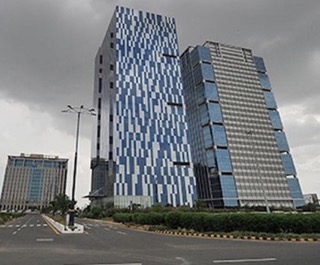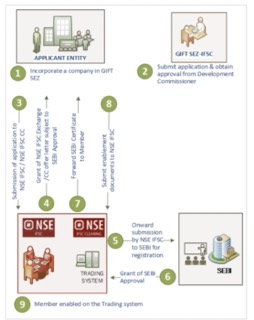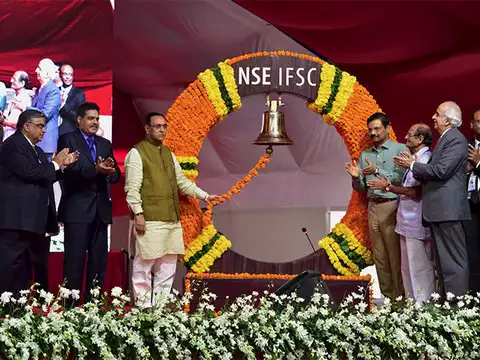NSE IFSC Limited (NSE International Exchange), incorporated on 29 November 2016 by the Gujarat Registrar of Companies, is a wholly-owned subsidiary of the National Stock Exchange (NSE). The development followed India’s leading stock exchange receiving approval from the capital market regulator Securities and Exchange Board of India (SEBI) to establish an international exchange in Gujarat International Finance Tech City (GIFT) – International Financial Service Centre (IFSC) Gandhinagar.

The NSE International Exchange was established to expand the financial market and bring capital into India. Stock exchanges in the GIFT IFSC are allowed to trade securities in any currency other than the Indian Rupee. These exchanges were primarily established to facilitate international investors seeking to trade Indian securities. All trading and settlement take place in US dollars, reducing the impact of currency fluctuations.
NSE IFSC: GIFT City
GIFT City is a special economic zone in the state of Gujarat. Stock exchanges in the GIFT IFSC are allowed to trade securities in any currency other than the Indian rupee. Trading in equity shares of companies incorporated outside of India, depository receipts, debt securities of eligible issuers, currency, index, interest rate, and non-agriculture commodity derivatives, and all categories of exchange-traded products that are available for trading on stock exchanges in FATF/ Noncompliant jurisdictions will be permitted, subject to SEBI approval. The International Financial Services Centres Authority regulates GIFT City (IFSCA).
Are Indian retail investors allowed to trade in GIFT City?
Yes, resident Indians are allowed to invest and trade in financial instruments at the GIFT City. However, the person must be a person resident in India as per FEMA (Foreign Exchange Management Act). When an Indian investor transfers funds to GIFT, it is treated as a money transfer out of India via LRS (Liberalized Remittance Scheme). So, a maximum of USD 250,000 per year can be invested through this route. More importantly, any funds transferred via LRS cannot be used to trade margined products or derivatives. One needs to have Demat account with the broker registered with NSE International Exchange.
NSE IFSC: Investing in US Stocks
While investors can trade in equity, currency and commodity derivatives at NSE IFSC, the biggest draw of NSE International Exchange has been the ability for investors to pick US stocks. The exchange has allowed investment in 50 stocks, including Amazon, Apple, Microsoft, Alphabet (Google), Netflix, Meta (Facebook), Walmart, Tesla, and other well-known publicly traded US corporations.
This does not necessarily imply that these stocks are listed in India. Rather, these stocks take the form of unsponsored depository receipts, in which market makers buy shares in the United States and issue their receipts. Since these are unsponsored receipts, there is no involvement or the consent of the company whose stock forms the basis for the transactions.
These receipts are known as NSE IFSC receipts, which investors can use for trading transactions through NSE IFSC’s registered brokers. In simple words, these receipts give the holder a proportionate beneficial interest in the underlying shares.
NSE International Exchange: How to Trade in US Stocks?
Let’s understand this with an example. To buy one share of Amazon for USD 92 in the US exchanges, one needs to have approximate INR 7,400. However, this requirement comes down by a factor of 10 in case of NSE’s International Exchange as it allows fractional ownership of global stocks. Simply put, one share of Amazon is represented by 10 IFSC receipts at the NSE International Exchange.
Nifty Auto Index – Important constituents and their weightage
What are NSE IFSC Unsponsored Depository Receipts?
- When a company listed on one country’s exchanges wants to attract investors and trade in another country, it uses Depository Receipts (DRs). If the company provides the DR, it is referred to as sponsored DR’, if the company is not involved, it is referred to as unsponsored DR.
- The DR’s that trade on the NSE’s global platform are unsponsored, which means that the depository receipts are not issued by the companies themselves. NSE partners with an international custodian (it has mandated HDFC Bank IBU to act as receipts custodian), who holds the shares in the United States on NSE IFSC’s behalf, and the custodian would then issue DRs to the depository account in India.
- These DR’s are subsequently listed on the NSE global platform. Because the exchange is new, the NSE IFSC has partnered with large market makers to ensure that they provide two-way quotes on the exchange for trading with low impact costs. Market makers would need to park the shares with the international custodian before providing sell quotes.
NSE IFSC Registered Brokers
Some well-known NSE IFSC registered brokers includes Anand Rathi, Edelweiss, Emkay, HDFC Securities, Motilal Oswal, and SMC Global. Several popular brokers such as Zerodha and Upstox are still unregistered with the international exchange.
Key Points About NSE’s Global Exchange
- IFSC receipts don’t constitute one share of a US stock. They are issued in some ratio or proportion of underlying asset or stock that is intended to be bought. For example, 50 NSE IFSC receipts may constitute one single US stock or 100 IFSC receipt may only represent half ownership of any given US stock.
- The market timings at NSE IFSC are different as compared to the India market. The market opens at 8:00 PM and closes at 2:30 AM.
- The price movement of the underlying security is a minimum of USD 0.01 which means that price can move from USD 1.64 to USD 1.65, USD 1.66 and so on.
NSE IFSC: Membership Categories
NSE provides four types of membership at its international exchange. Members are chosen through a rigorous and transparent process to ensure the smooth and secure operation of the exchange systems.
| Trading Member | This membership category allows a member to execute trades on his own account as well as on behalf of his clients; however, clearing and settlement of trades executed through the Trading Member must be done through a Trading-cum Clearing Member or Professional Clearing Member of the NSE IFSC Exchange. |
| Trading Cum Self Clearing Member | This membership category entitles a member to execute trades and to clear and settle the trades executed on his own account as well as on his clients. |
| Trading Cum Clearing Member | This membership entitles a member to execute trades on his own behalf as well as on behalf of his clients, as well as to clear and settle trades executed by themselves and other trading members who choose to use the member’s clearing services. |
| Professional Clearing Member | This category of membership entitles a member to clear and settle trades of such members of NSE IFSC Exchange who choose to clear and settle their trades through this member. |
NSE International Exchange: Membership Process

- Incorporate a company in GIFT SEZ
- Submit application to GIFT SEZ-IFSC & obtain approval from Development Commissioner
- Submission of application to NSE IFSC / NSE IFSC CC
- Grant of NSE IFSC Exchange/CC offer letter subject to SEBI Approval
- Onward submission by NSE IFSC to SEBI for registration
- Grant of SEBI Approval
- Forward SEBI certificate to member
- Submit enablement documents
- Member enabled on the Trading system
This was all about investing in US stocks through NSE’s global platform. Happy Investing!

- Coinsmart. Europe’s Best Bitcoin and Crypto Exchange.Click Here
- Platoblockchain. Web3 Metaverse Intelligence. Knowledge Amplified. Access Here.
- Source: https://ipocentral.in/nse-ifsc-nse-international-exchange-us-stocks/





